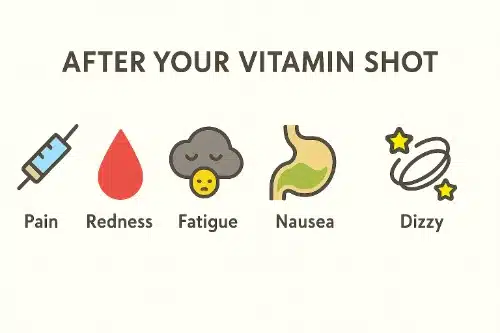Takeaways
-
Vitamin injections can cause mild side effects like soreness, redness, or fatigue—most resolve within 48 hours.
-
Serious reactions are rare but possible, especially in patients with allergies, kidney issues, or medication conflicts.
-
Proper screening, preparation, and symptom tracking help make vitamin injections safer and more predictable.
Why Understanding Side Effects Matters
Many people assume vitamin injections are harmless because they contain natural compounds. That assumption often leads to a lack of proper screening and patient preparation. Common side effects may be minor, but unanticipated symptoms can quickly shake confidence and delay recovery. When patients understand what to expect, they feel more in control and less anxious. At Fountain of Youth SWFL, we discuss potential side effects in advance and tailor every injection plan to the individual. That transparency encourages informed decisions and builds long-term trust.
Common Immediate Reactions
Injection-Site Symptoms
Mild irritation at the injection site is one of the most common reactions people report. Symptoms may include temporary redness, swelling, itching, or soreness lasting up to 48 hours. These responses reflect the body’s basic inflammatory process—not an allergic reaction. Cleaning the site well, using the right needle, and rotating injection locations can reduce discomfort. Fountain of Youth SWFL trains all staff on proper technique to minimize injection trauma and maximize patient comfort. Studies like the NCBI injection technique guidelines confirm the importance of proper delivery methods.
The following table outlines common vitamin injection reactions, including timing and management strategies. It helps readers interpret symptoms and take appropriate action.
| Reaction Type | Typical Onset | Normal Duration | Recommended Care |
|---|---|---|---|
| Redness, swelling, itching | Immediately to 2 hours | Up to 48 hours | Cold pack, rotate site, watch for infection |
| Pain or soreness | During & immediately after | 1–3 days | Warm compress, OTC pain relief, rest |
| Fatigue, nausea, mild fever | Within 1 hour | Few hours to 1 day | Hydration, light food, rest at home |
| Dizziness, vasovagal response | During or shortly after | Minutes to 1 hour | Sit or lie down, rehydrate, breathe slowly |
Systemic Mild Effects
Vitamin injections sometimes cause fatigue, lightheadedness, or brief episodes of nausea. These effects usually appear within an hour of injection and fade quickly with hydration and rest. Some patients also notice a mild fever or warmth, especially after B12 or high-dose B-complex formulations. Eating beforehand and staying hydrated can reduce the chance of symptoms. Our team always recommends patients track their first few experiences to better understand their individual responses.

Some patients may experience delayed hypersensitivity, where joint pain or rashes appear hours or days after injection.
Rare but Serious Reactions
Allergic & Hypersensitivity Cases
Though rare, allergic reactions to vitamin injections can happen—especially if preservatives or additives are present. Anaphylaxis, while uncommon, remains a medical emergency requiring immediate treatment. Some patients may experience delayed hypersensitivity, where joint pain or rashes appear hours or days after injection. These signs point to immune activation rather than nutrient overdose. NHS reports common side effects such as mild skin irritation and rare severe reactions.
Organ-Specific Concerns
Certain nutrients place strain on the kidneys or heart if not properly dosed or screened. High doses of vitamin B12 can lower potassium levels, which may stress cardiac function. Vitamin D, especially in active forms like calcitriol, increases calcium levels and must be used carefully in renal patients. A NIH study on methylmalonic acid linked renal impairment to diagnostic confusion in B12 testing. That’s why our protocols always factor in recent lab work and organ status before treatment.
Patient Preparation to Minimize Risk
Pre-Injection Checklist
Simple steps can help reduce injection-related discomfort and improve how the body responds. Patients should always arrive hydrated and eat a light meal about one hour before the injection. The site should be disinfected and allowed to dry completely before needle entry. It’s also smart to wear loose clothing and plan for light activity post-appointment. We guide each patient through these steps before their first session so they feel confident and ready.
Medication & Medical History Review
Some prescriptions interfere with how vitamins function or how the body metabolizes them. Metformin and proton pump inhibitors can skew B12 markers, while diuretics may increase electrolyte shifts post-injection. Conditions like G6PD deficiency, chronic kidney disease, or autoimmune syndromes can also change the risk profile. That’s why we take time to understand each patient’s medical history before recommending nutrient therapies. We see each body as unique and adjust accordingly.

This infographic shows the five most common physical reactions you may experience after a vitamin injection.
Managing Reactions at Home
Mild Symptoms
Common symptoms like soreness or warmth usually go away with rest and simple care. Patients can apply a cold pack for swelling or a warm compress to ease tight muscles. Hydration and avoiding strenuous activity for a day can also help. Pain relievers like acetaminophen or ibuprofen may be used if needed. We encourage all patients to check in if symptoms linger or worsen unexpectedly.
When to Seek Medical Attention
Sometimes what appears mild may signal something more serious. Difficulty breathing, facial swelling, or a spreading rash requires immediate evaluation. Delayed symptoms like joint stiffness, large hives, or prolonged fever should not be ignored. These reactions often reflect immune activity or sensitivity rather than infection. We always advise patients to err on the side of caution and contact us directly with any concerns.
FAQ
Why did I feel dizzy after my vitamin shot?
That may relate to vasovagal response, low hydration, or nutrient impact on blood pressure. Sitting down and hydrating usually helps.
Are mild fevers after injection normal?
Yes, they can happen as your immune system responds to a new compound. They rarely last more than a day.
Could vitamins cause kidney issues or cardiac stress?
Only in patients with pre-existing conditions or improper dosing. We check lab markers before recommending injections.
How long should injection-site reactions last before I worry?
Most disappear in 48 hours. If symptoms worsen or spread, contact your provider for a closer look.
3 Practical Tips
Tip 1: Eat and hydrate before your appointment to prevent nausea or dizziness during your injection.
Tip 2: Rotate injection sites and relax your muscles to reduce soreness and tissue irritation.
Tip 3: Keep track of your response in a short symptom log to better understand your body’s patterns. Patients concerned about post-injection appearance or skin irritation often explore our beauty drips for skin-focused support.
A Better Path Toward Safer Vitamin Injections
Experiencing side effects from vitamin injections doesn’t mean the treatment failed—it means your body responded. Learning which reactions are normal versus concerning allows for faster relief and better outcomes. At Fountain of Youth SWFL, we aim to educate before we inject and follow up after. That full-circle support ensures your safety stays front and center. By anticipating reactions and adjusting care, we help you get the most out of every treatment.
Medical review: Reviewed by Dr. Keith Lafferty MD, Fort Myers on June 21, 2025. Fact-checked against government and academic sources; see in-text citations. This page follows our Medical Review & Sourcing Policy and undergoes updates at least every six months.




